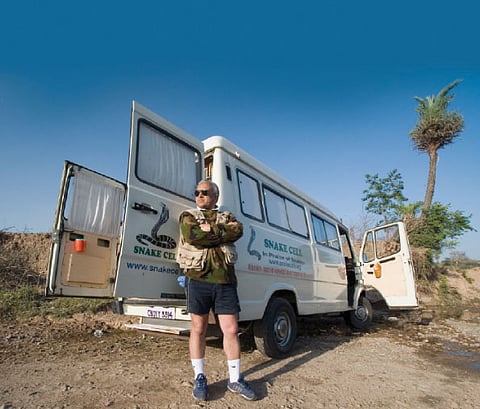

It promises to be a wildlife photography tour like no other. A sand-coloured exterior painted with leaves camouflages the hi-tech caravan in-the-making that would take eight participants on expeditions across Rajasthan, Himachal Pradesh and parts of coastal India.
This custom-made caravan will have a seating capacity of 15. It will also have bunker beds, a kitchen and toilet and be fully air-conditioned. It will also have rooftop tents and a new concept of tray tents. A large LED monitor would display slide shows and help in communication in field locations. The vehicle will also carry Elinchrom strobes and accessories to set up an outdoor studio. Vehicles similar to this one are used by tour companies in the West and in Africa.
And Captain (retd) Suresh Sharma, 52, fondly addressed as Captain by friends, is the one-man army behind it all. He conceived the Green Dot Express to take travellers to exotic locales, where they can network with other wildlife and photography enthusiasts.
“We replicate the Army’s fighting column, getting all the support required to perform right there on location, in the middle of action. We are committed to organising infrastructure of quality, which will save energy, time, effort and money of photographers who wish to explore life and culture of India through their cameras with us,” beams Sharma, who lives in Chandigarh.
After handling brutal combat situations in the jungles of Sri Lanka as a member of the Indian Peace Keeping Force (IPKF), Sharma decided to hang his boots and pursue his passions—snake conservation, travelling and photography.
Dressed in a dungaree, Sharma supervises work as his caravan is being built at a fabrication workshop in Manimajra Motor Market building. He recalls how it all started. His love of outdoors and adventure made him join the Army. “During IPKF operations in Sri Lanka, I met researchers who were making films on snakes. On my request, one of them gave me a snake to hold but due to fear, I panicked and dropped it. To get rid of my fear, and people’s fear and ignorance about snakes, I then decided to swap my army boots with jungle boots and a year after the Sri Lankan operations, I left the Army,” he says.
Sharma decided to pursue tourism and photography which helps him raise funds for nature conservation. Also on a mission to save snakes, Sharma runs the Snake Cell. For this service, he responds to calls by residents who spot snakes in their houses. He captures the reptiles for free and releases them into the wild. He has rescued 5,500 snakes to date. He and his wife, Dr Rajbir Kaur, are also into snake photography. A homeopathic doctor, Kaur has juggled motherhood with the life of adventure. Their lives have been enriched by their shared experiences and unconditional support for one another through a common passion.
“He has championed many causes, including looking after disabled soldiers, finding habitats for snakes lost in urban areas and educating people about them,” she says.
Sharma has also made numerous presentations at the Indian Institute of Management (Ahmedabad), National Institute of Design, medical colleges, national parks, universities, and Wildlife Institute of India on the subject of snake conservation.
In a custom-built caravan of his own, Sharma has over a period of 14 years clocked over one lakh km with his family and friends in his home-on-wheels called King Cobra. “My nature conservation and education programmes under the Snake Cell were self-funded for 15 years. I did raise funds through wildlife tourism package tours, also through BBC’s wildlife magazine,” he says.
“Through my new concept of photography tours, I will raise funds for nature conservation so that I can run education programmes on snakes, print booklets on how to handle snake bites and give lectures at schools.”
“The best way to explore any country is through a self-sufficient vehicle that has all basic comforts. These tours will be from three days to three weeks in Rajasthan, Himachal Pradesh and Coastal India,” he says.